#actuallyosdd
Text
Honestly I think something really shitty about having trauma regarding people hurting you, is that it's possible to have this underlying paranoia that if you say ANYTHING about that person/those people anywhere on the Internet, they'll somehow see it or find it and come attacking you or spread lies about you or something. Legit don't know how people on Reddit give such obvious details about situations and somehow they don't get scared lol
This is something we've started to realize we definitely struggle with regardless of how anonymous we try to be or details we try to change or leave out.
It's not rational by any means, and we're aware of that. But if anyone else experienced this type of anxiety, understand that you're not alone and it's a battle for sure
#paranoia#sorry not sure what all to tag this#actually traumagenic#osdd#did#actuallydid#actuallyosdd#trauma#anxiety#tw
22 notes
·
View notes
Text
Hey, you! You who suspect you might have PTSD, DID or another trauma disorder, but you think you didn't experience trauma "bad enough" to have developed a mental disorder from it? Let me suggest looking at it differently:
"If there's smoke, there's fire"
Do you experience symptoms of PTSD, such as hypervigilance, trouble sleeping, flashbacks, memory problems, dissociation, ect? Then yes, it was "bad enough". Maybe you don't remember anything "really bad" happening or you don't "feel like" it affects you, but listen to your body. The body remembers and the body doesn't care if you think it is "stupid" or "weak" to have a panic attack when someone touches you or that you still have nightmares about that thing you saw when you were 4 years old
Trauma isn't what happened. Trauma is the reaction to what happened. So what I'm trying to say is that if the reason you think you can't have PTSD/DID/OSDD/ect is because you didn't go through anything horrific enough for that, then maybe forget about what happened to you for a moment and just look at the evidence your body and mind are showing. And then, most importantly, be compassionate with yourself. You're going through a lot and it's gonna be okay in the end. Take it easy, okay? <3
#posting now instead of forgetting it in a draft per usual#actually traumatized#actually ptsd#actually did#actually cptsd#actually cdd#actually osdd#actually dissociative#actuallytraumatized#actuallyabused#actuallydissociative#actuallydid#actuallycdd#actuallyptsd#actuallycptsd#actuallyosdd#personal#my posts
1K notes
·
View notes
Text
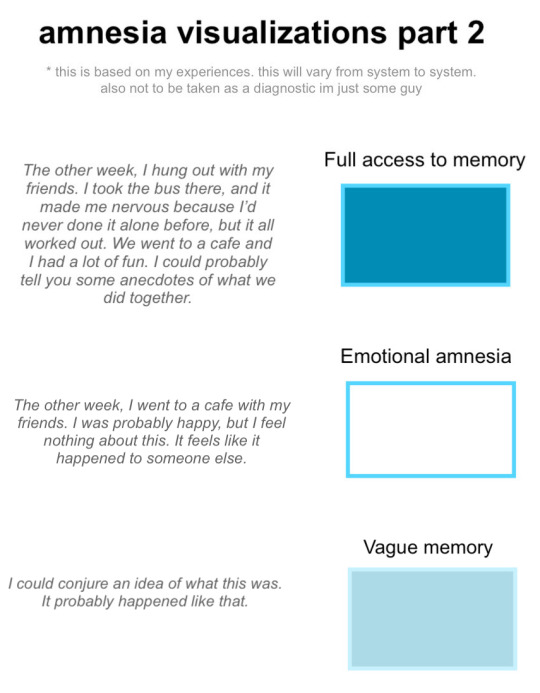
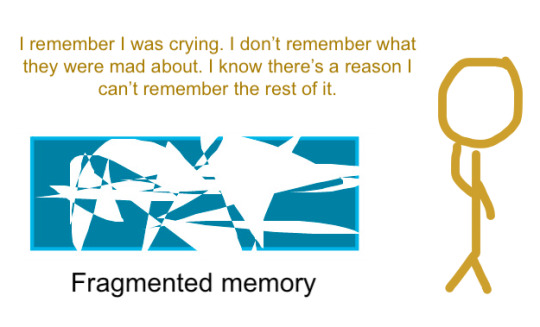

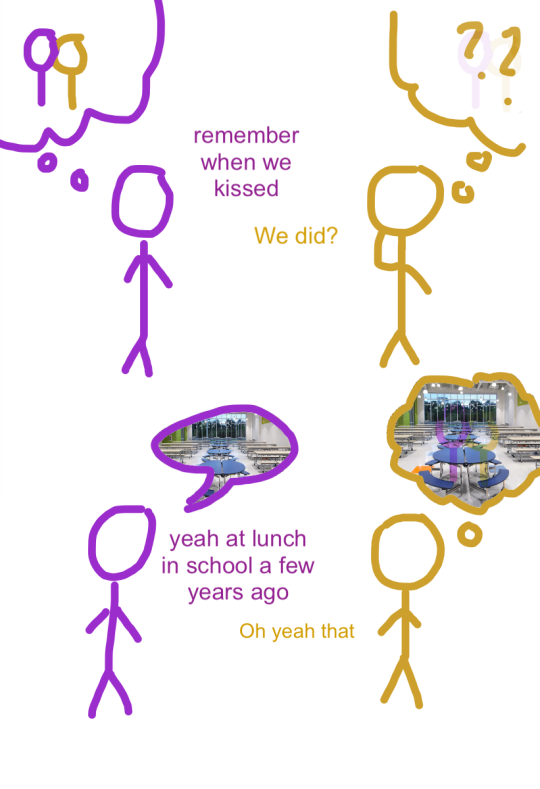
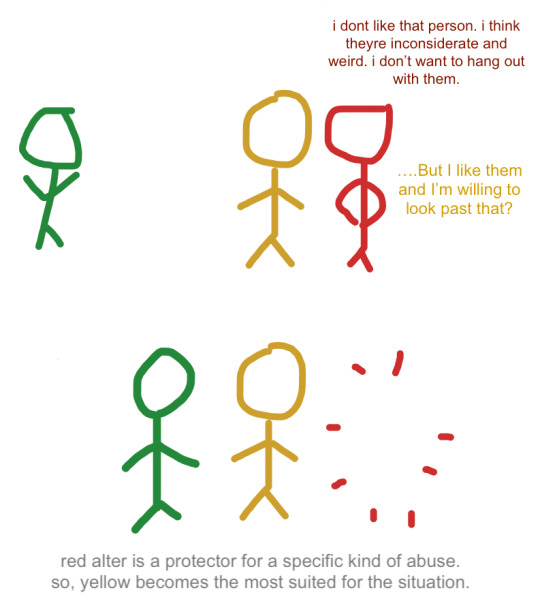

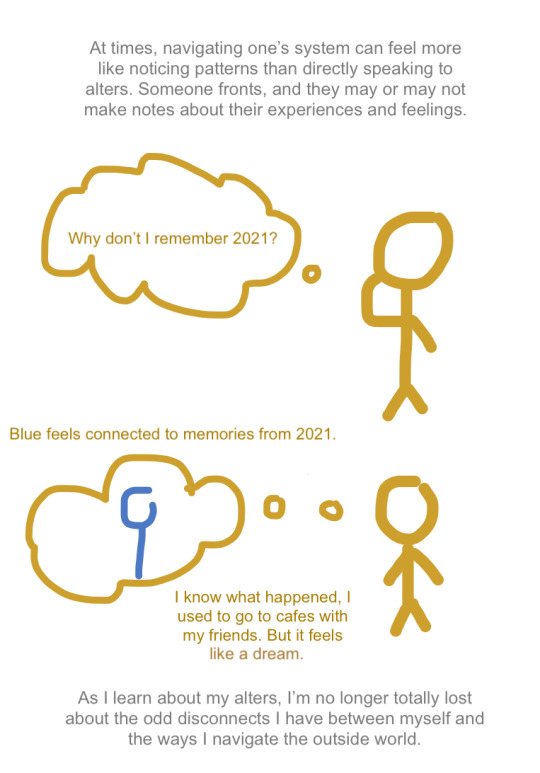
a sequel to this post
2K notes
·
View notes
Text
It's fucking funny when you start to notice the "tells" of certain alters, such as speech patterns, posture, voice pitch, accent, hand gestures, ect.
Like "wait a minute... why am I fucking man spreading like a fucking clown.... oh.... oh it's him."
#idk if this makes sense lol#ours#actuallydid#actually did#actuallyosdd#actuallypdid#actually cdd#actuallycdd#actuallydissociative#actually pdid#actually osdd#actually dissociative#did things#did stuff#cdd things#cdd stuff
1K notes
·
View notes
Text
Things that can happen in DID/OSDD but people don’t talk about them as much:
An alter being co-conscious or influencing you without you knowing.
Being aware of a co-con alter but not knowing who they are.
Having difficulty telling apart your inner experiences. (Was that an alter or was I just feeling differently or was I just daydreaming?)
Having difficulty identifying your own emotions. (I feel “something”)
Knowing how to do something yet feeling like you don’t or shouldn’t know how to do it. (How do I know how to use this phone? I feel like it’s 1998 when I didn’t know what a phone was yet.)
Being in a familiar place/situation yet feeling confused, like it’s unfamiliar. (I’ve lived in this house for 7 years but I feel like this is my first time ever being in it.)
Being confused that your body is smaller/taller than you thought.
Feeling or being unable to do things that you normally can do at other times. (I just couldn’t drive the other day. I don’t know how. I just forgot how to do it.)
Things that happened a few days ago feel like months ago, or things that happened months ago feel like a few days ago.
Experiencing pain, headaches, visual impairment, or other physical symptoms that doctors can’t find a cause for.
Waking up as a different alter than the one who went to bed.
A co-conscious alter being able to influence or take control of certain body parts (like using the arms to hold & comfort you).
Being unable to tell if you’re dreaming or awake.
Feel free to add on!
#actuallydid#actuallyosdd#actuallydissociative#actuallytraumagenic#dissociative identity disorder#sunflower posts
2K notes
·
View notes
Text
host as a kid: Oh man, it's really easy for me to slip into character and become a whole different person! I even get lost in the character and truly believe I'm them. I even lose track of how long I've been pretending to be a character. This must mean I'm a gonna be a great actor when I grow up :)
host as an adult: why can't i remember my childhood
#snails 🍂#ghost 🦷#companion_planting#actually did#actually osdd#actuallydid#actuallyosdd#did system#osdd system#actually dissociative#did osdd#didosdd#osddid#traumagenic system#traumagenic#actually traumagenic#system
3K notes
·
View notes
Text
Finding Your Identities: Figuring Out Your Alters When Your Alters Aren't "Distinct" "People"
I have been wanting to make this post for a very long time now.
I have talked countless times on this blog about how a lot of the "how to figure out your alters" lists do not and cannot apply to me, or systems who may be like me, for a variety of reasons.
We do not have distinct senses of selves, we don't feel like our own distinct individuals, in any way whatsoever. There is no specific, unique, distinct "cue" or feeling or anything that tells me I've switched, or tells me that a specific, distinct alter is fronting who is different from any other alters. There is no specific, distinct THING that tells me "okay yeah that was very obviously and specifically and undeniably a different alter."
It's easy to deny you have alters when your alters are not distinct individuals who know they are their own unique, separate selves. It's easy to deny you have alters when it always feels like "you."
If you don't experience your alters as distinct 'entities' where you can obviously and distinctly refer to them as "that is (that specific alter) and that is not (these other alters)", it can be nearly impossible to figure out your alters at all.
This has been a horrible aspect of my denial since essentially the beginning. I mean, when everything online tells you that DID involves a distinct sense of "not me" to it, how can you know if you have it if it doesn't feel that way to you?
Now obviously I DO have that feeling of "not me"... It's just not described using those specific words. I was taking it all way too literally (thanks, autism NFKDSFDKJ).
It's more like "I don't really feel that way anymore" or "yeah I felt that way, but not anymore."
Or "I don't really relate to that anymore" or "I don't really like this as my identity anymore" or "I don't like this name anymore."
Or "this feels like someone else's life" (but more of a feeling, it's not like I just suddenly don't know anything in my life anymore. I know my girlfriend and love her still and I know I live in this house, etc.)
I'll feel like I am attending therapy because I have to, or I'll feel like I'm relaying information that I know factually, as if I was told a story of things that happened and I have to relay that information to someone else.
Or just generally a weird feeling that something is off.
And that's the thing - dissociation (for me personally) is less like "things aren't real" and "I'm not real" and more like just a vague feeling that something is OFF, and you don't know what, and you can't explain it.
I remember as a kid feeling like I'm the "only conscious being" or "feeling like I'm in an anime" or "acting out a dramatic scene in a movie." Now all three of those descriptions still fall under "feeling like things aren't real/etc." but I never interpreted it that way, because of how literally I take things, I didn't make the connection, because I never used the SPECIFIC wording of "feeling like I'm not real/feeling like the world isn't real/etc."
I straight-up told one of the first therapists I saw for a DID diagnosis that I "don't really dissociate at all" because I don't really experience the "nothing is real/I'm not real/etc."
This, too, brought me a lot of denial, because people only describe dissociation as "things don't feel real", "you don't feel real", "you feel like you're floating", "you're watching yourself", "you're watching the world through fog/glass", etc. And because I never really used those specific words to explain my feelings and experiences, I figured I wasn't really experiencing any dissociation, or at least just very rarely and mildly so.
That's a key thing here - the WORD CHOICES being used to describe alters, systems, CDD experiences, etc. don't really match up with my experiences at all. I take things extremely, extremely literally, and when everybody describes their alters and refers to them as distinct, different people, it's hard to feel like your experiences are the more common experience, especially when people around you might continue to reinforce that denial, by assuming you must not have alters, or you have a different disorder, etc., because you are "always awake and present no matter what alter is fronting", etc.
Your personal interpretation of your experiences matters a LOT when it comes to CDDs, figuring out if you have a CDD, and it also plays a large role into how your system might present/feel/look/what alters you have/etc.
For example, many people interpreted their alter experiences and switches as creating characters. That, then, might become a huge aspect of figuring out your alters - you might realize that many of the characters you've made (or all of them) through the years were actually alters. With that lens, you might, then, be able to have a lot of knowledge about your alters based off of that alone - those "characters" might have specific characteristics, lore, designs, etc. that you then realize were all a part of that alter.
You might also, then, find that each time you find yourself making a "new" "character", it's actually just a new alter forming/splitting (or perhaps them just finding out their own identity).
The way you personally interpret your experiences, your feelings, your life, memories, etc. all impact your alters and your system - the way your alters identify, the way it FEELS when alters front, the way your system presents, etc.
I grew up believing I was making things up and lying for seemingly no reason, for attention, because I liked being cool and special. Or that I was purposely acting out a fake, dramatic movie, just to add more drama.
In reality, I was experiencing alter switches and dissociation, but because I interpreted it in those ways, we now have a very difficult time trying to accept and believe that these are real feelings, real experiences, outside of my control, instead of me just saying things for attention and acting dramatic just because.
I also very much grew up feeling like "nothing ever sticks, so why bother taking anything seriously." Now, pretty much all of us still have this attitude, this feeling of "why bother coming up with a name, why bother taking (my feelings, etc.) seriously when it's just gonna go away and not come back."
I would feel confident in a decision or an identity or a name change and so on, only for me to change it the next day, or the next week, and so on.
This made things like questioning my gender identity and wanting to change my name extremely difficult and impossible because I could never be sure if it was going to actually STICK or just be a temporary, fleeting "phase." I became upset (and still become upset and distressed) every time everything turned out to just be a "phase" instead of a real, actual thing. I still have trouble with this. If I want to cut my hair or dye my hair or get new clothes, I will never be able to know for sure if I'll still like it in a different state. If I want a name change, I don't know if it'll be long-term or if I will change my mind the next day.
DID is more like this, and less like "I'm a totally different person with a distinctly different personality and a different name and I am not ("host")."
And if this is relatable to you, this post may very much help you figure out who your alters are.
A lot of things online that try to give suggestions and ideas for figuring out your alters in a way of "ask (your alters) these questions."
For me, I can't really do that, for a variety of different reasons - our dissociative barriers are too high, there's no inner world, and there's no kind of "distinct voices" that I "hear" speaking to me that are coming from a distinctly different "person." And since we as alters do not experience ourselves as distinct individuals where we just know who we are and know we are our own distinct individuals, it's less like asking my alters these questions, and more like asking MYSELF these questions. I want you keep that in mind going into this post.
When it comes to figuring out alters, what helps me is trying to keep track of patterns of changes in my behaviors, likes, dislikes, hobbies/interests, and more.
The following is a TEMPLATE of things you can ask yourself at different times, during different moods, modes, self-states - whatever you wanna call it.
I tried to make them as general as possible in order to hopefully make the questions apply to a general audience/a wide variety of people, instead of being too specific where they might not apply to most people.
You do not have to ask yourself all of these questions! If you don't know the answer to a question, and/or you don't want to answer a question, it can be important to write that down too! You can skip any questions or change them in any way you like.
If a question feels unhelpful to you, feel free to change it into something that might feel more helpful to you personally, and/or just remove it altogether.
Feel free to expand upon these questions! For example, if a question seems helpful to you, you might have further ideas to expand upon that question into further, more specific questions. I actually totally encourage other people to expand upon these questions and come up with more questions that could help others! Definitely share your thoughts in reblogs if you want.
I want to make it clear, first, that this post is NOT trying to make people OBSESS over this!!!! These questions are meant to help figure out alters, but don't obsess over it!
The purpose of these questions is to simply try and keep track of possible patterns of behaviors, etc., not to obsess over figuring out your alters, not to obsess over figuring out what alter you are, not to obsess over making sure your alters are "consistent all the time" or something. It doesn't matter about knowing "who" you are so much as it matters to let yourself exist as you are, at any given moment. It's to allow yourself to exist and see if there is a pattern of emotions, opinions, preferences, likes, dislikes, interests/hobbies, behaviors, and more that crop of every so often - this is what alters are for a lot of people. Like I said, it's less like "distinct, separate person" and more like a recurring pattern of the same/similar emotions/behaviors/traits/etc. that crop up every so often, oftentimes in response to things, such as topics that you may find triggering (for example: feeling like an angry wolf every time the topic of physical abuse comes up, or feeling like a scared child when you feel like someone said something upsetting), or even positive topics, such as feeling like you become a girl whenever the topic of fashion gets brought up, or feeling like you're 13 when the topic of a childhood beloved TV show comes up.
While "feeling like (xyz) in response to (xyz)" does not necessarily mean you have a CDD, this post is specifically about those experiences under the context of having a CDD. If you relate to anything I wrote in this post, it does not necessarily mean you have a CDD! Similarly, if you DON'T relate to anything in this post, it also doesn't mean you DON'T have a CDD! I am sharing this post with the assumption that the people reading it already know they have a CDD, and/or strongly suspect it.
Questions to ask myself for figuring out alters:
Month day, year. Time (or whatever way you want to write down the month/day/year/time).
What name(s) do I like?:
This doesn't have to be names of specific alters (by that I mean, you don't have to go through your list of alters with specific names to figure out if you like one of them). You can write a vague idea of what name/names you might like (such as "a name related to plants" or "a name that reminds me of the ocean"). You can write down multiple names. You can write down no name. You can write down that you're indifferent. Anything!
What pronouns do I like?:
Again, you can write down anything. If multiple sets of pronouns vibe, write that down! If nothing vibes, write it down! If you don't have any strong feelings/if you're indifferent, write that down too! If you don't know, write that down!
Are there any particular labels I feel drawn to/feel I identify with?:
It can be an LGBTQ+ label (bisexual, demiboy, aromantic, lesbian, etc.), or a label related to something else
What kind of color(s) am I drawn to?:
Darker colors? Pastel colors? Neon colors? Light colors? Etc.
What do I want to do? What would I do if I had the resources (time, money, 'skill', motivation, energy, etc.) (for example, maybe you wish you could play guitar, but you can’t play guitar, don’t have a guitar, etc.)?:
Similarly, is there anything that I might normally be interested in that I find myself no longer wanting to do?:
-- Listening to music:
What songs?
Am I singing along?
What are the songs about?
How do I feel about the music?
Are there any songs I dislike?
Any particular common genre/theme with the music I find myself liking right now?
-- Art:
- What kind of art (Digital art? Doing makeup? Sculpting? Knitting? Painting? Woodworking? Photography? Any art counts.)
- What is my art style like/what tools am I using? (If digital art, what program am I using? What brushes am I using? Etc. (Different alters might prefer to use different art programs and different art brushes!))
- What does the artwork depict? (Vent art? Are there themes of trauma? Dissociation? Fanart? Something else?)
-- Playing a game:
- What game?
- What am I doing in the game? Are there different game modes? If so, what mode am I playing? Is my character customizable, and if so, how does my character look? (Some alters might prefer to change the way the character looks to match how they might feel inside!)
- Are there any games I don't currently care for?
-- Watching YouTube:
- What is the topic of the video? (Is it about a hobby I like? A TV series? A video essay? Something else?)
-- Playing an instrument:
- What instrument?
- Am I trying to learn a specific song/songs?
- Am I making my own music? Are there lyrics to go along with it?
- If it’s a specific song (either writing your own, or trying to learn how to play a certain song on an instrument), what is it about? Any specific themes that stick out?
-- Writing:
Poetry? Working on a book/short story?
What is it about?
What genre? (Romance? Non-fiction? Etc.)
Is it fanfiction?
-- Reading:
What am I reading?
What is it about?
What genre? (Romance? Non-fiction? Etc.)
Is it fanfiction?
-- Something else…
What am I thinking about?
What am I talking about?
How am I feeling?
Did something trigger me to feel this certain way?
If something triggered me to feel a certain way, do I know the reason(s) why? (For example, if you encountered something that brings up trauma-related feelings, etc.)
You might describe your feelings in ways other than a simple “sad”, “mad”, or “happy.” You might be more specific, such as “I feel like white noise” or “I feel like a dog” or “I feel like an ocean.” This is completely valid and an important thing to keep note of as well. You can even write down that you feel tall, or you feel a different age, or you feel like a certain character.
There are many more questions that you could ask 'yourself' to get to know 'yourselves.' This list is not exhaustive, and like I said, you can simply you this template to bounce off ideas of what questions you, personally, would find most helpful!
I'd love to hear anybody's input, and I hope this post helps anyone. :] If not, feel free to share around anyway, if you want!
340 notes
·
View notes
Text

596 notes
·
View notes
Text
I'm going to say it
Tiktok often makes me feel really fake as a system
So as a general reminder:
It's okay to not have noticeable switches
It's okay to not have an overt presentation of the disorder
It's okay for alters to be similar to you and to each other
Its okay to not have accents, or huge differences in styles, interests, likes, etc
It's okay to not switch for long periods of time
It's okay to never fully switch
It's okay if they're not constantly talking in the background
It's okay to not be able to feel/hear everyone all the time
It's okay to have a big OR small system, and for it to work however it's working
It's okay if your disorder IS disordering and you don't always like it, or them
It's a GREAT if your disorder isn't causing any distress or dysfunction right now
It's okay to be angry and frustrated with each other, just as much as it's okay to be happy and close-knit
It's okay that if, as you're getting older, things start to quiet down and settle, and things are less active and overt symptoms happen less
It's okay to not want those things
And it's just as okay to experience all of those things
None of these things, whether you experience them or not, are signs of someone else faking
864 notes
·
View notes
Text
Believe me when I say that I understand how frustrating it is that people are treating things like autism and DID/OSDD systems and ADHD and such as quirky, silly little identities, instead of the very, very real and oftentimes debilitating disorders and disabilities that they are. But your frustration should be towards that, not the people who feel proud and feel empowered by their disabilities.
(I cannot possibly mention every disability and disorder, but this applies to a wide variety of disabilities)
#(Octo.txt)#DID System#OSDD System#ActuallyOSDD#ActuallyDID#Autism#Neurodivergent#ActuallyAutistic#ADHD#ActuallyADHD#ActuallyNeurodivergent
173 notes
·
View notes
Note
“Come to the front, fucker! I know you love this shitty music!”
.
74 notes
·
View notes
Text
Just a reminder that systems who post memes, haha content, otherwise lighthearted stuff, are probably doing so because real life sucks and there's not many avenues in which we can express positivity when we have such stigmatized disorders. It doesn't inherently mean that they're trying to make these disorders look "fun" or like it's always "sunshine and rainbows".
Remember that we can be proud of who we are
Remember that we can be positive to the best of our abilities
Remember that we can be happy and enjoy life. Our existence doesn't have to be fully defined by suffering, even if we had pretty f*cking rough starts to life.
Remember that it's not somehow wrong to love all parts of you
322 notes
·
View notes
Text
I want every mental health professional that has treated me through out my life to get into a roman amphitheatre with a weapon of their choosing and the winner will decide what disorders I have
#actuallymentallyill#actuallytraumatized#actuallynd#actuallytraumatised#actuallybipolar#actuallydepressed#actuallyplural#actuallymultiple#nd memes#actuallyadhd#actuallydissociative#actuallydid#actuallypdid#actuallyosdd#actuallymanic#my posts#personal
3K notes
·
View notes
Text

763 notes
·
View notes
Text

#edited in ms paint bc im too lazy to open a real editing program hhdhkhd#actuallydissociative#actuallydissociating#actuallydid#actuallyosdd#actuallypdid#actuallyosddid#did memes#osdd memes#dissociation memes#depersonalization#dissociation#actually dissociative#actually dissociating#actually did#actually osdd#actually pdid#actuallytraumatized#trauma memes#ironically enough i think im lowkey dissociating rn :skull:#ours#idk who's here#i think it's sof#yo its sof
4K notes
·
View notes
Text
Developing an Inner Safe Space for Parts
Note: This post was written for people with dissociative disorders, but anyone else can use the methods here if they're helpful!

This post is all about inner safe spaces! What is an inner safe space, though? Here's what Coping with Trauma-related Dissociation says:
"Inner safe spaces are images of places where you can be safe, relaxed, and cared for. These images have been shown to be helpful to many people, not just those with dissociative disorders. This type of imaginal activity is well known to produce a feeling of relaxation and well-being in those who use it regularly. If your inner experience feels so jarring, unsafe, and frightening, as it often does in individuals with dissociative disorders, the ability to imagine these spaces becomes especially important and helpful."
Inner safe spaces can be useful for many things. You can use it to relax & alleviate anxiety. It can be a tool for soothing dissociated parts of the self, or aide in your communication with them. You or other parts can enter your inner safe space to protect yourself from feeling overwhelmed or potential triggers. Overall, creating an inner safe space can help make your mind a safer, calmer place.
So, how do you make one? All you have to do is imagine it!
Your inner safe space can be anything you want to imagine. There are no rules and it can always be changed! You can create one imaginary place for all parts of your system to share & add to. Or, each part of your system can create their own inner safe spaces to match their own needs. Some people already experience some sort of inner world, too. This can always be changed in order to make it feel safer and calmer for all parts of the system.
🌟 Ideas for inner safe spaces:
Outdoor areas like a meadow, beach, forest, mountain, etc.
Buildings like a cabin, tree house, castle, library, etc.
Vehicles like a car, pirate ship, submarine, spacecraft, etc.
Something underground, underwater, in the sky, or in space.
An entire planet or world of your own.
A fictional world that brings you comfort.
An inner safe space isn't a safe space if it doesn't make you, including all parts of you, feel safe. A good place to start is by writing down things that make you feel safe. If you don't know what makes you feel safe, try looking at what makes you feel less unsafe. It might also help to ask a loved one or therapist for help!
Invite your system to include their own needs, too. Try not to judge them even if you disagree. It's important for all parts of the system to feel safe.
🌟 Ideas for things that you can add/adjust to make your inner safe space feel more comfortable:
Add games, food, and movies that you like
Create individual rooms for each part of the system
Give yourself an inner appearance that makes you happy
Add your favorite colors, sounds, smells, & sights
Add people, characters, animals & creatures that you like
Give yourself a comfortable bed, with soft blankets & maybe even some plushies
Add pride flags!
Create a protective force field around your safe space
You or other parts may want to have a safe space that no one else can intrude upon and that's okay. It's important to respect each other's privacy. You can also adjust the inner safe space to make communication between parts easier! For example, you could add intercoms, mailboxes, telephones, or even a meeting area for aiding communication.
🌟 Having trouble visualizing, or can't visualize things at all? Try...
Drawing or painting it.
Writing about it.
Building it. You can use a video game like the Sims (get it for free!) or Minecraft.
Basing it off of a real place.
Collecting photos/videos of what you want it to be like. You can find royalty-free images on Unsplash and Pixabay. Or you create a Pinterest account!
Filling a journal, document, blog, or discord server with pictures, writing, and anything you want about your inner safe space!
Trying guided exercises for creating inner safe spaces. (IMO this is best done with a therapist's help.)
Asking your friends, therapist, or loved ones for their suggestions.
Creating a physical safe space instead of an inner one.
#actuallydid#actuallydissociative#actuallyosdd#actuallytraumagenic#actuallymultiple#multiplicity#dissociative identity disorder#dissociation#parts work#working with parts#DID recovery#DID support#headspace#inner world#inner safe space#long post#resources
497 notes
·
View notes